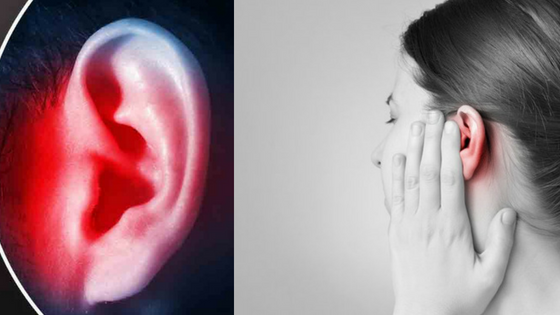

A ruptured eardrum can result in hearing loss. The eardrum can rupture (break) in severe cases of ear barotrauma, causing bleeding or leaking of fluid from the ear. It can create pain and hearing difficulty similar to a middle ear infection. Fluid behind the eardrum is called serous otitis media. This fluid is drawn out of blood vessels in the lining of the inner ear, and can only drain if the Eustachian tube is open. In more severe cases of barotrauma, the middle ear can fill with clear fluid as the body tries to equalize the pressure on both sides of the eardrum. Your ear will feel stuffed and you may feel as if you need to "pop" it. This can cause pain and can muffle sounds. The pressure change can create a differential between the outer and middle ear that pushes the eardrum inward. Barotrauma of the ear also can happen when scuba divers descend. On an airplane, barotrauma to the ear – also called aero-otitis or barotitis – can happen as the plane descends for landing. Ear barotrauma can occur when these tubes become blocked or partially blocked. These bubbles are constantly moving into the middle ear, where they balance the ear's inner pressure. This is a bubble of air being moved through the Eustachian tube. When you swallow, you may notice a small click in your ears. This connects your ear with the back of your mouth. The only connection between your middle ear and the "outside world" is a thin canal called the Eustachian tube. Your middle ear includes the eardrum and the space behind it. Generalized barotraumas, also called decompression sickness, affects the entire body. Last updated on Jan 12, 2022.īarotrauma refers to injuries caused by increased air or water pressure, such as during airplane flights or scuba diving.

That is, when you’re whipping along in the open air at more than 100 miles per hour, apparently it’s not such a great time to turn your head for a chat.Medically reviewed by. Still, they hope it might raise awareness of the potential for ear barotrauma among other rollercoaster enthusiasts. The patient in this case improved after three days, and researchers say that the injury was a combination of very specific circumstances. Researchers say that, while 0.61 psi isn’t enough to rupture the ear drum, it can certainly cause significant pain (0.62 psi is enough to crush small blood vessels in the hand, they point out).

The case study was presented last Friday as part of the Combined Otolaryngology Spring Meetings in Las Vegas. When doctors looked into his ears, they found that, while the left one looked completely normal, his right ear canal was swollen and the ear drum inflamed. Researchers estimate that the patient’s ear drum was exposed to pressure of about 0.61 pounds per square inch (psi) - within 36 hours, he was complaining of severe pain. Instead, he was riding a rollercoaster and made the mistake of turning to the left to chat with his girlfriend when it hit speeds of 120 miles per hour. Yet the 24-year-old patient who began complaining of severe pain in his right ear hadn’t been underwater, above 30,000 feet or in a war zone. The condition is most common among people who have been scuba diving or traveling by plane and, more recently, among soldiers exposed to bomb blasts in Afghanistan and Iraq. Doctors at Henry Ford Hospital in Detroit recently treated a patient for ear barotrauma - an imbalance of pressure between the inside and outside of the ear that can cause pain and swelling and even temporary deafness.


 0 kommentar(er)
0 kommentar(er)
